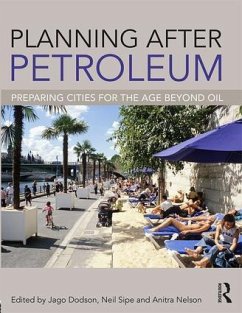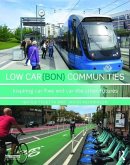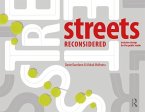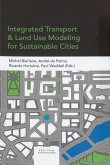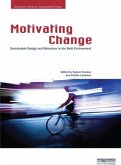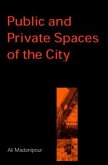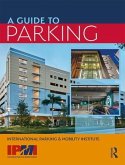Planning After Petroleum
Preparing Cities for the Age Beyond Oil
Herausgeber: Dodson, Jago; Nelson, Anitra; Sipe, Neil
Planning After Petroleum
Preparing Cities for the Age Beyond Oil
Herausgeber: Dodson, Jago; Nelson, Anitra; Sipe, Neil
- Broschiertes Buch
- Merkliste
- Auf die Merkliste
- Bewerten Bewerten
- Teilen
- Produkt teilen
- Produkterinnerung
- Produkterinnerung
Tackles the social and economic vulnerability of cities to petroleum depletion and rising oil prices.
Andere Kunden interessierten sich auch für
![Low Car(bon) Communities Low Car(bon) Communities]() Nicole FolettaLow Car(bon) Communities85,99 €
Nicole FolettaLow Car(bon) Communities85,99 €![Streets Reconsidered Streets Reconsidered]() Daniel IacofanoStreets Reconsidered50,99 €
Daniel IacofanoStreets Reconsidered50,99 €![Integrated Transport and Land Use Modeling for Sustainable Cities Integrated Transport and Land Use Modeling for Sustainable Cities]() Integrated Transport and Land Use Modeling for Sustainable Cities87,99 €
Integrated Transport and Land Use Modeling for Sustainable Cities87,99 €![Motivating Change: Sustainable Design and Behaviour in the Built Environment Motivating Change: Sustainable Design and Behaviour in the Built Environment]() Motivating Change: Sustainable Design and Behaviour in the Built Environment94,99 €
Motivating Change: Sustainable Design and Behaviour in the Built Environment94,99 €![Systemic Architecture Systemic Architecture]() Marco PolettoSystemic Architecture78,99 €
Marco PolettoSystemic Architecture78,99 €![Public and Private Spaces of the City Public and Private Spaces of the City]() Ali MadanipourPublic and Private Spaces of the City73,99 €
Ali MadanipourPublic and Private Spaces of the City73,99 €![A Guide to Parking A Guide to Parking]() A Guide to Parking74,99 €
A Guide to Parking74,99 €-
-
-
Tackles the social and economic vulnerability of cities to petroleum depletion and rising oil prices.
Hinweis: Dieser Artikel kann nur an eine deutsche Lieferadresse ausgeliefert werden.
Hinweis: Dieser Artikel kann nur an eine deutsche Lieferadresse ausgeliefert werden.
Produktdetails
- Produktdetails
- Verlag: Taylor & Francis
- Seitenzahl: 250
- Erscheinungstermin: 6. Oktober 2016
- Englisch
- Abmessung: 244mm x 188mm x 20mm
- Gewicht: 499g
- ISBN-13: 9780415504584
- ISBN-10: 0415504589
- Artikelnr.: 45327146
- Herstellerkennzeichnung
- Libri GmbH
- Europaallee 1
- 36244 Bad Hersfeld
- gpsr@libri.de
- Verlag: Taylor & Francis
- Seitenzahl: 250
- Erscheinungstermin: 6. Oktober 2016
- Englisch
- Abmessung: 244mm x 188mm x 20mm
- Gewicht: 499g
- ISBN-13: 9780415504584
- ISBN-10: 0415504589
- Artikelnr.: 45327146
- Herstellerkennzeichnung
- Libri GmbH
- Europaallee 1
- 36244 Bad Hersfeld
- gpsr@libri.de
Jago Dodson is Professor of Urban Policy and Director of the Centre for Urban Research, RMIT University (Melbourne, Australia). His work has addressed theoretical and applied problems in housing, transport, urban planning, infrastructure, energy and urban governance. He has advised governments on urban policy and is active in scholarly and public debates about Australian cities. Neil Sipe is Professor of Planning in the School of Geography, Planning and Environmental Management at the University of Queensland (Brisbane, Australia). His research interests include transport and land-use planning, natural resource management and international comparisons of planning systems. Anitra Nelson is Associate Professor at the Centre for Urban Research, RMIT University (Melbourne, Australia). She edited Steering Sustainability in an Urbanizing World: Policy, Practice and Performance (2007), co-edited Sustainability Citizenship in Cities: Theory and Practice (2016, Earthscan/Routledge) and is writing Small is Necessary: Shared Living on a Shared Planet (2017).
Acknowledgements
List of Figures
List of Tables
List of Abbreviations
Notes on Contributors
Foreword
Brendan Gleeson
Introduction
1. Investigating Cities After Oil: Planning for Systemic Urban Oil
Vulnerability
Jago Dodson, Neil Sipe and Anitra Nelson
Part I. Energy Horizons
2. A Stormy Petroleum Horizon: Cities and Planning Beyond Oil
Jago Dodson
3. The Paradox of Oil: The Cheaper it is, the More It Costs
Samuel Alexander
4. Institutional Planning Responses to a Confluence of Oil Vulnerability
and Climate Change
Tony Matthews and Jago Dodson
5. Energy Security and Oil Vulnerability Responses
Jago Dodson and Neil Sipe
6. Post-Petroleum Urban Justice
Wendy Steele, Lisa de Kleyn and Katelyn Samson
Part II. Transport and Land Use
7. Walking the City
John Whitelegg
8. Cycling Potential in Dispersed Cities
Jennifer Bonham and Matthew Burke
9. Children's Active Transport: An Upside of Oil Vulnerability?
Scott Sharpe and Paul Tranter
10. Public Transport Networks in the Post-Petroleum Era
John Stone and Paul Mees
11. Oil and Mortgage Vulnerability in Australian Cities
Jago Dodson and Neil Sipe
12. Outer Suburbs, Car Dependence and Residential Choice in France
Benjamin Motte-Baumvol and Leslie Belton-Chevallier
13. Greenspace After Petroleum: From Freeways to Greenways
Jason Byrne
III. Urban Systems
14. Local Energy Plans for Transitions to a Low Carbon Future
Brendan F.D. Barrett and Ralph Horne
15. Motor Vehicle Fleets in Oil Vulnerable Suburbs: A Prospect of
Technology Innovations
Tiebei Li, Neil Sipe and Jago Dodson
16. Energy for Cities
Cheryl Desha and Angela Reeve
17. The Role of Telecommunication in Post-Petroleum Planning
Tooran Alizadeh
18. Peak Oil: Challenges and Changes for the Air Transport Industry
Douglas Baker, Nicholas Stevens and Md. Kamruzzaman
Conclusion
19. Planning and Petroleum Futures: Research Directions
Neil Sipe, Jago Dodson and Anitra Nelson
Index
List of Figures
List of Tables
List of Abbreviations
Notes on Contributors
Foreword
Brendan Gleeson
Introduction
1. Investigating Cities After Oil: Planning for Systemic Urban Oil
Vulnerability
Jago Dodson, Neil Sipe and Anitra Nelson
Part I. Energy Horizons
2. A Stormy Petroleum Horizon: Cities and Planning Beyond Oil
Jago Dodson
3. The Paradox of Oil: The Cheaper it is, the More It Costs
Samuel Alexander
4. Institutional Planning Responses to a Confluence of Oil Vulnerability
and Climate Change
Tony Matthews and Jago Dodson
5. Energy Security and Oil Vulnerability Responses
Jago Dodson and Neil Sipe
6. Post-Petroleum Urban Justice
Wendy Steele, Lisa de Kleyn and Katelyn Samson
Part II. Transport and Land Use
7. Walking the City
John Whitelegg
8. Cycling Potential in Dispersed Cities
Jennifer Bonham and Matthew Burke
9. Children's Active Transport: An Upside of Oil Vulnerability?
Scott Sharpe and Paul Tranter
10. Public Transport Networks in the Post-Petroleum Era
John Stone and Paul Mees
11. Oil and Mortgage Vulnerability in Australian Cities
Jago Dodson and Neil Sipe
12. Outer Suburbs, Car Dependence and Residential Choice in France
Benjamin Motte-Baumvol and Leslie Belton-Chevallier
13. Greenspace After Petroleum: From Freeways to Greenways
Jason Byrne
III. Urban Systems
14. Local Energy Plans for Transitions to a Low Carbon Future
Brendan F.D. Barrett and Ralph Horne
15. Motor Vehicle Fleets in Oil Vulnerable Suburbs: A Prospect of
Technology Innovations
Tiebei Li, Neil Sipe and Jago Dodson
16. Energy for Cities
Cheryl Desha and Angela Reeve
17. The Role of Telecommunication in Post-Petroleum Planning
Tooran Alizadeh
18. Peak Oil: Challenges and Changes for the Air Transport Industry
Douglas Baker, Nicholas Stevens and Md. Kamruzzaman
Conclusion
19. Planning and Petroleum Futures: Research Directions
Neil Sipe, Jago Dodson and Anitra Nelson
Index
Acknowledgements
List of Figures
List of Tables
List of Abbreviations
Notes on Contributors
Foreword
Brendan Gleeson
Introduction
1. Investigating Cities After Oil: Planning for Systemic Urban Oil
Vulnerability
Jago Dodson, Neil Sipe and Anitra Nelson
Part I. Energy Horizons
2. A Stormy Petroleum Horizon: Cities and Planning Beyond Oil
Jago Dodson
3. The Paradox of Oil: The Cheaper it is, the More It Costs
Samuel Alexander
4. Institutional Planning Responses to a Confluence of Oil Vulnerability
and Climate Change
Tony Matthews and Jago Dodson
5. Energy Security and Oil Vulnerability Responses
Jago Dodson and Neil Sipe
6. Post-Petroleum Urban Justice
Wendy Steele, Lisa de Kleyn and Katelyn Samson
Part II. Transport and Land Use
7. Walking the City
John Whitelegg
8. Cycling Potential in Dispersed Cities
Jennifer Bonham and Matthew Burke
9. Children's Active Transport: An Upside of Oil Vulnerability?
Scott Sharpe and Paul Tranter
10. Public Transport Networks in the Post-Petroleum Era
John Stone and Paul Mees
11. Oil and Mortgage Vulnerability in Australian Cities
Jago Dodson and Neil Sipe
12. Outer Suburbs, Car Dependence and Residential Choice in France
Benjamin Motte-Baumvol and Leslie Belton-Chevallier
13. Greenspace After Petroleum: From Freeways to Greenways
Jason Byrne
III. Urban Systems
14. Local Energy Plans for Transitions to a Low Carbon Future
Brendan F.D. Barrett and Ralph Horne
15. Motor Vehicle Fleets in Oil Vulnerable Suburbs: A Prospect of
Technology Innovations
Tiebei Li, Neil Sipe and Jago Dodson
16. Energy for Cities
Cheryl Desha and Angela Reeve
17. The Role of Telecommunication in Post-Petroleum Planning
Tooran Alizadeh
18. Peak Oil: Challenges and Changes for the Air Transport Industry
Douglas Baker, Nicholas Stevens and Md. Kamruzzaman
Conclusion
19. Planning and Petroleum Futures: Research Directions
Neil Sipe, Jago Dodson and Anitra Nelson
Index
List of Figures
List of Tables
List of Abbreviations
Notes on Contributors
Foreword
Brendan Gleeson
Introduction
1. Investigating Cities After Oil: Planning for Systemic Urban Oil
Vulnerability
Jago Dodson, Neil Sipe and Anitra Nelson
Part I. Energy Horizons
2. A Stormy Petroleum Horizon: Cities and Planning Beyond Oil
Jago Dodson
3. The Paradox of Oil: The Cheaper it is, the More It Costs
Samuel Alexander
4. Institutional Planning Responses to a Confluence of Oil Vulnerability
and Climate Change
Tony Matthews and Jago Dodson
5. Energy Security and Oil Vulnerability Responses
Jago Dodson and Neil Sipe
6. Post-Petroleum Urban Justice
Wendy Steele, Lisa de Kleyn and Katelyn Samson
Part II. Transport and Land Use
7. Walking the City
John Whitelegg
8. Cycling Potential in Dispersed Cities
Jennifer Bonham and Matthew Burke
9. Children's Active Transport: An Upside of Oil Vulnerability?
Scott Sharpe and Paul Tranter
10. Public Transport Networks in the Post-Petroleum Era
John Stone and Paul Mees
11. Oil and Mortgage Vulnerability in Australian Cities
Jago Dodson and Neil Sipe
12. Outer Suburbs, Car Dependence and Residential Choice in France
Benjamin Motte-Baumvol and Leslie Belton-Chevallier
13. Greenspace After Petroleum: From Freeways to Greenways
Jason Byrne
III. Urban Systems
14. Local Energy Plans for Transitions to a Low Carbon Future
Brendan F.D. Barrett and Ralph Horne
15. Motor Vehicle Fleets in Oil Vulnerable Suburbs: A Prospect of
Technology Innovations
Tiebei Li, Neil Sipe and Jago Dodson
16. Energy for Cities
Cheryl Desha and Angela Reeve
17. The Role of Telecommunication in Post-Petroleum Planning
Tooran Alizadeh
18. Peak Oil: Challenges and Changes for the Air Transport Industry
Douglas Baker, Nicholas Stevens and Md. Kamruzzaman
Conclusion
19. Planning and Petroleum Futures: Research Directions
Neil Sipe, Jago Dodson and Anitra Nelson
Index

